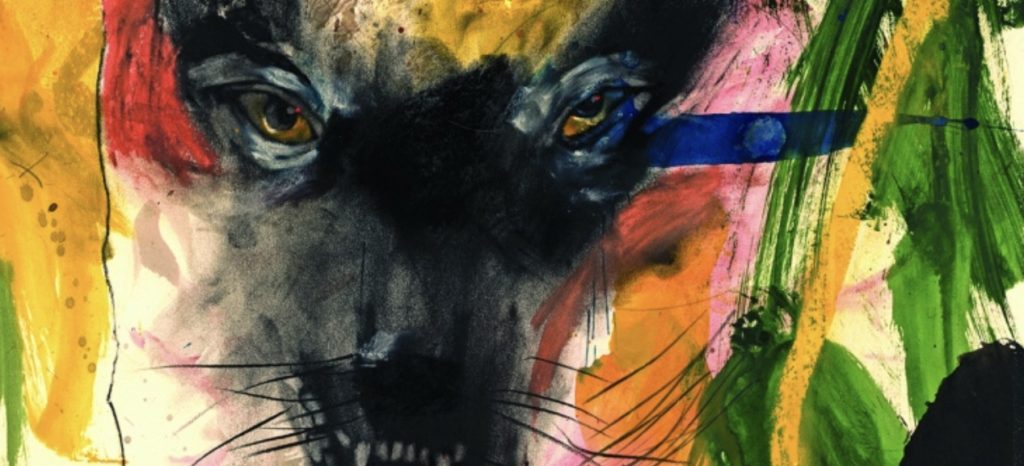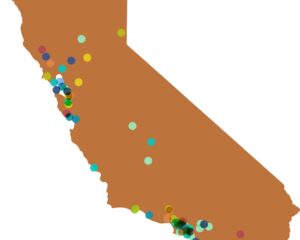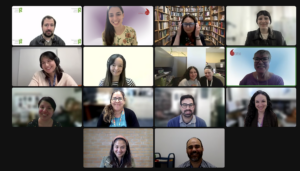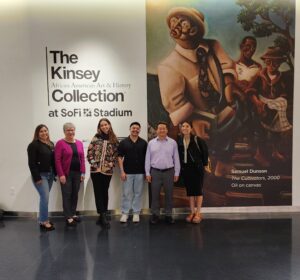October marks National Arts and Humanities Month (NAHM), and at California Humanities we are taking the time to address a common question we get: what are the humanities, and how are they connected to the arts?
The answers to this question are as varied and diverse as the people of California. You could check out our About page’s section on “What are the Humanities, Anyway?” for what we think is a pretty good attempt at answering this question. Particularly relevant this month:
“One way might be to see [the humanities] broadly as a range of activities and practices revolving around cultural life, whatever the setting might be. In this sense, anyone who reads a book or listens to a story, appreciates a work of art, reflects upon the meaning of life, records their memories or chronicles an event, passes on a tradition or wonders where it came from, or asks questions about the values and motivations of human actors, past, present, or future, is ‘practicing’ the humanities.”
For almost 40 years we’ve been sharing stories, asking questions, reflecting on meaning, and honoring traditions. For 2019’s NAHM, we’re continuing to share up-to-the-present day examples of how the humanities—through our work and that of our grantees and partners—intersects with the arts to help us better understand what it means to be human.
Follow along on social media or check back here every Friday for a new story about a project in California highlighting the arts and humanities in their community with weekly themes set by Americans for the Arts in partnership with the National Humanities Alliance on Fridays.
Week 1 Theme: Past, Present, Future
In 2012, California Humanities’ longtime Board Member and Chair Nancy Hatamiya, who displayed a passion and enthusiasm for public service, arts and the humanities, passed away. In her memory, and in recognition of her past dedication, the Nancy Hatamiya Arts and Humanities Fund was created to support future projects that promote the humanities though the visual and performing arts.
One such project in the most recently-awarded round of Humanities for All Quick Grants similarly focuses on themes of past, present, and future in the Native American community in California. Visual Sovereignty: A Symposium on Contemporary Native American Art and Activism, a one day symposium on October 19 at The Crocker Art Museum in Sacramento, will include a series of lectures and panel talks designed to explore the powerful role art plays in keeping Native traditions and culture alive and thriving after generations of attempted colonialist erasure and genocide.
Presented in conjunction with an exhibition of contemporary Native American art, When I Remember, I See Red: American Indian Art and Activism in California, symposium hopes to engage present day conversations about Native Californian culture through a historical lens on the past while looking towards the future.
Help us continue to do this important and compelling work. Join us by making a contribution to the Nancy Hatamiya Arts and Humanities Fund today.
SACRAMENTO–Visual Sovereignty: A Symposium on Contemporary Native American Art and Activism
Week 2 Theme: Inspired by…
Many people who encounter the word “humanities” for the first time often find it defined in relation to—and against—”arts.” The truth is, the arts and the humanities have much in common, a theme we’ve explored in many different ways since California Humanities began in 1975. Since 2016, we’ve showcased these intersections in a new exhibition program based out of our Oakland office, The Art of Storytelling. A series of exhibits that tells stories of our changing state through the arts, The Art of Storytelling has included everything from photographs taken by Mimi Plumb at the birth of the Central Valley’s farmworker movement, to artwork and poetry by people serving life without parole sentences in California, to incredible quilts from the historic and storied African American Quilt Guild of Oakland.
Our latest installment in the series, We Are More: Stories by Queer Comic Artists, showcases the work of four Oakland-based artists of color, alongside behind-the scenes clips of forthcoming California Documentary Project-supported film NO STRAIGHT LINES. The documentary by Vivian Kleiman—based on the book of the same name by author & historian Justin Hall—explores the history of queer comics through the work of five prominent artists throughout the country. The exhibition of work by Ajuan Mance, Breena Nuñez, Lawrence Lindell, and Trinidad Escobar, provides a perfect compliment of four contemporary creators working in varied mediums and formats to tell stories inspired by by—if not explicitly about—their experiences as queer-identified people.
On Thursday, October 10, the second of two public programs connected to the exhibit brought young people together from Oakland to experience a Youth Sketch & Snack—where they enjoyed hands-on sketching with exhibition artist Ajuan Mance. They were joined by young filmmakers Truly Edison and Grace Patterson from Reel Stories to watch a screening of their short film AFTER THE STORM, which tells the story of a gay artist whose ability to pursue her passion in art is jeopardized by a homophobic hate crime. The rich discussion included a conversation with youth about how art and media-making can be a part of their future. Reel Stories, an organization that creates a path for young women and gender non-conforming youth to make their own content and enter media careers, is also a recipient of one of our first-ever California Documentary Project NextGen grants.
Help us continue to do this significant work, supporting people of all backgrounds to tell their own stories through the intersections of arts, humanities, and media-making, and make a contribution today.
Week 3 Theme: Cultural Heritage
California has more immigrants than any other state. That’s according to the Public Policy Institute of California, which also states that more than a quarter of our residents were born outside of the country—two times more than the rest of the US. Immigrants make up more than a third of the population in major metropolitan areas like San Francisco and Los Angeles, and over half of the children in California are second-generation, meaning that at least one of their parents is an immigrant. With numbers like these, it’s clear that California is shaped in many ways by people that come from abroad. But how adept are we at welcoming them, and the diverse cultures they carry?
Enter the public library. Across the US, public library systems are known as refuges, respites, and places of learning that are welcome and open to all. Libraries engage immigrant communities using English as a Second Language programs, bilingual staff, translated materials, and collections in other languages. Beyond these common approaches, California libraries are increasingly looking to build deeper connections with these communities. The Library Innovation Lab does just that, providing support, training, and resources to a cohort of library staff. Since 2017, every year a new group of public libraries builds capacity and tests out new programs that respond to the needs of immigrants through cultural programming with California Humanities’ support.
One example—in the 2019 cohort, the Orange County Public Libraries, led by Adult Services Librarian Zoe Nash, is sharing the immigrant and refugee experience through visual storytelling to promote empathy and understanding on the part of the broader community. At the Fountain Valley Branch, which serves a large Vietnamese and Vietnamese American population, new programs include art journaling and art storytelling workshops, cultural performances, and speakers about the immigrant and refugee experience. Participants will get notebooks in which they can share their stories, experiences as refugees and immigrants, and their cultural traditions through art. In December, completed notebooks will be displayed at an art exhibition and opening reception at the library, and will travel to two other libraries, after which they’ll be added to the library’s collection and available for the community to browse. And the name of the program, which really gets at the heart of the Library Innovation Lab’s aims? Libraries Are for Everyone.
FOUNTAIN VALLEY—Lion Dance and Traditional Vietnamese Drumming
Week 4 Theme: Advocacy
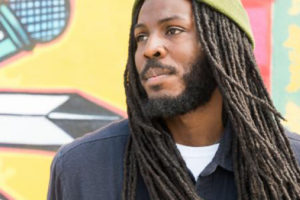 “The point of this documentary was to talk about, ‘What if we can introduce this curriculum to the young folks now and at the end of our play our Romeo and Juliet didn’t die. No more of us are going to die and this is how we envision our future to be.’ I’m thankful that California Humanities had the resources to help us amplify that voice.”
“The point of this documentary was to talk about, ‘What if we can introduce this curriculum to the young folks now and at the end of our play our Romeo and Juliet didn’t die. No more of us are going to die and this is how we envision our future to be.’ I’m thankful that California Humanities had the resources to help us amplify that voice.”
—Donté Clark, Spoken word artist and central character in ROMEO IS BLEEDING
In May of 2018, California Humanities went to the Capitol as part of our ongoing efforts to inform the legislature about the public humanities and our work across the state. We brought together twelve grantees, staff, partners, and Board Members to testify at a session of the Joint Committee on Arts led by Senator Ben Allen and Assemblymember Kansen Chu. Called California and the Humanities: Building Bridges and Amplifying Voices, the hearing involved two hours of testimony during which twelve of our partners spoke for over two hours on the impact of the public humanities across California.
Donté Clark, an actor and community activist as well as former Poet Laureate of Richmond, California, was one such speaker. Asa key participant in the California Humanities-supported film ROMEO IS BLEEDING, Donté shared about the impact that our funding had on the production of the film, and for him and the young people he works with in the arts program RAW Talent. The documentary follows Donté’s journey as he leads the youth through the development and performance of a new play,Té’s Harmony, a re-telling of Romeo and Juliet with a focus on issues that affect Richmond youth, particularly the gang violence that has divided the community.
The humanities hearing, including the testimony of speakers like Donté, was a highlight of our continuing multi-year efforts to engage our elected officials throughout the state. These efforts resulted in California Humanities receiving our first ever funding from the State of California this year. The new funds will help California Humanities expand the reach of our existing suite of programs, including grantmaking, ensuring that more stories like Donté’s will be heard throughout California.
For more information about National Arts and Humanities Month, visit the Americans for the Arts website.

